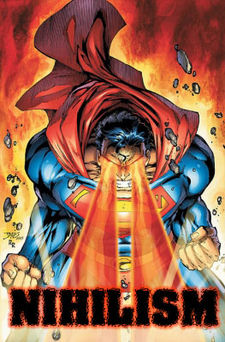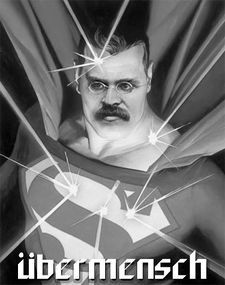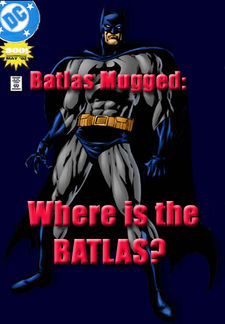Übermensch

Übermensch is a German comic book series created by cartoonist Friedrich Nietzsche which was wildly popular among philosophers and narcissists alike. The series follows the character "Übermensch" a superhero with extraordinary powers. The first appearance of Übermensch was in Nietzsche's 1883 book "Thus Spoke Zarathustra" in which the main character was a superhero with strong moral values. The popularity of the character motivated Nietzsche to create a comic series dedicated specifically to his adventures. By the early 1900s it had gained much popularity and had become a German cultural icon.
Comic Book Character[edit | edit source]
Übermensch, also referred to in the comic as "The Übermensch", was born as Kal-El on the alien planet Krypton. Since this was an Anderewelt (English:other world), Übermensch surpassed it, returning to earth, and gaining incredible superpowers due to the smaller size of earth in relation to Krypton. He was found and raised by a Kansas farmer and his wife as Clark Kent
Early on in the comic, Übermensch aspires to become a benevolent hero, with a strong moral code, and also to surpass Nihilism. Since Krypton, Übermensch's home, was destroyed, Earth is the only real world, all other worlds are merely hopes created to draw humans away from the earth. In addition, Übermensch manages to avoid all other forms of metaphysics, Platonism, and asceticism, as they are also manifestations of other-worldliness.
While Übermensch has super-human powers and is invulnerable to most physical and metaphysical dangers, contact with the radioactive music of Wagner renders him an ordinary human, susceptible to their failings and to their false values.
Superpowers[edit | edit source]
Übermensch possesses many superpowers, a result of several factors, including Earth's smaller size in relation to Krypton, it's yellow star, which gives all Kryptonians unique powers, and the death of God. Some of Übermensch's powers include:
- Flight - Übermensch possesses a telekinetic field which can maintain enough lift to allow him to fly, and to break free from the denigration and mortification of the body.
- Super Strength/Speed - Übermensch is much stronger and faster than an average human, due to Earth's smaller size.
- Tough Skin - Übermensch's skin can resist anything short of an artillery shell, as well as human failings and false inventions such as Truth and Nature.
- Heat Vision - Übermensch can use his vision to heat things rapidly.
- Creation of new values out of nothing more than Nihilism.
- The ability to grow any sort of facial hair instantly. - It is still unknown why Nietzsche included this power, but it may have been due to his frustration with growing a full beard.
Other Characters[edit | edit source]
There are several other supporting characters in the comic book series.
- Clark Kent - Übermensch's mild mannered alter ego. He is a philosopher and writer of books, who also guest lectures at the University of Chicago. It is believed this is character is based off of Nietzsche himself.
- Lois Lane - A female reporter who works for the local newspaper. She is commonly depicted as Übermensch's companion, sidekick, or love interest. She first appeared in issue #12.
- God - A major character early on in the comic, God is a good friend of Übermensch, though He does sometimes get annoyed at the latter thinking love to be a slaver's tool. Unlike in more unrealistic works, this version of God is not a deity, but an ancient strange cosmic entity older than physics and spacetime(Or, more simply, a Yog-Sothoth-wizard thingy), that provided physics and moral values to the people of earth all throughout its history, from creation to that time He became a man(Nieztche considers this man to be his predecessor). Unfortunately, in issue #43, when many of his followers lost their faith, he died because eldritch cosmic entity rules man can't understand, creating a catastrophic moral vacuum, which Übermensch was forced to repair.
- Lex Luthor - Übermensch's arch-nemesis and a notorious nihilist. He first appears in issue #52, when he is revealed to be the leader of a nihilist ring which appeared after the death of god. Every chance he gets he tries to draw Übermensch away from this world. Of course, Übermensch foils his dastardly plans every time. Famous for coining the phrase: "Curse you Übermensch!"
Cultural Impact[edit | edit source]
Übermensch has made a large impact on German culture and has become a cultural icon. The strong leftist and individualist themes throughout the comic have influenced the overall mentality of the German race, who sometimes refer to themselves as "The Master Race". It heavily infulence the life of Adolph Hitler despite his being Austrian rather than German.
Other celebrities whose careers have been heavily influenced by are Leopold and Loeb, the two University of Chicago graduates who are famous for liberating Bobby Franks from the shackles of existence.
Film Adaptation[edit | edit source]
Übermensch was developed into a movie adaptation, directed by Woody Allen. Despite a low budget and a poor directing job, the film was a huge success in Germany. It was even used as propaganda for a short time after World War I during the economic depression.
American Adaptation[edit | edit source]
The Übermensch series has been translated from German to English for an American adaptation. "Übermensch" was translated to "Superman" although that translation is slightly inaccurate, as "Overman" is the true translation. While the American version remains true to the original story. German readers will notice that several parts have been omitted, mostly the parts discussing serious philosophical issues. Due to concerns during the late 1930's, including the rise of Hitler in Germany, the government thought it best to omit those parts in favor of a more morally conservative version which the heavily protestant and conservative American public would agree with.
Crossovers[edit | edit source]
In 1936, the American artist Bob Kane and the Russian novelist and philosopher Ayn Rand began publishing a comic book designed to introduce a mass audience to the philosophy of rational self-interest known as Objectivism. The comic book, Batlas, featured Bruce Galt, the billionaire heir to an industrialist fortune who practiced high-tech vigilantism from a series of caves while tirelessly working to avoid paying capital gains tax.
Starting in the 1960s and continuing through the mid-1990s, the American publisher of Batlas and the German publisher of Übermensch produced a series of popular one-shot comics in both German and English featuring the Übermensch and Batlas working together to fight crime, denounce mankind's affinity for the paranormal, and roll back certain elements of President Roosevelt's "New Deal" legislative package. The small print run of the 1989 limited series "Batlas vs. Übermensch", "Batlas & Übermensch vs. Predator" and "Batlas & Übermensch vs. Predator, Alien & Wolverine" remain highly sought-after collector's items.
Criticism[edit | edit source]
Major sources of criticism for the series have come from Zionists and Holocaust denial deniers who claim it's moral ambiguity served as a motive for the rise of the Nazis in Europe and the Holocaust.



